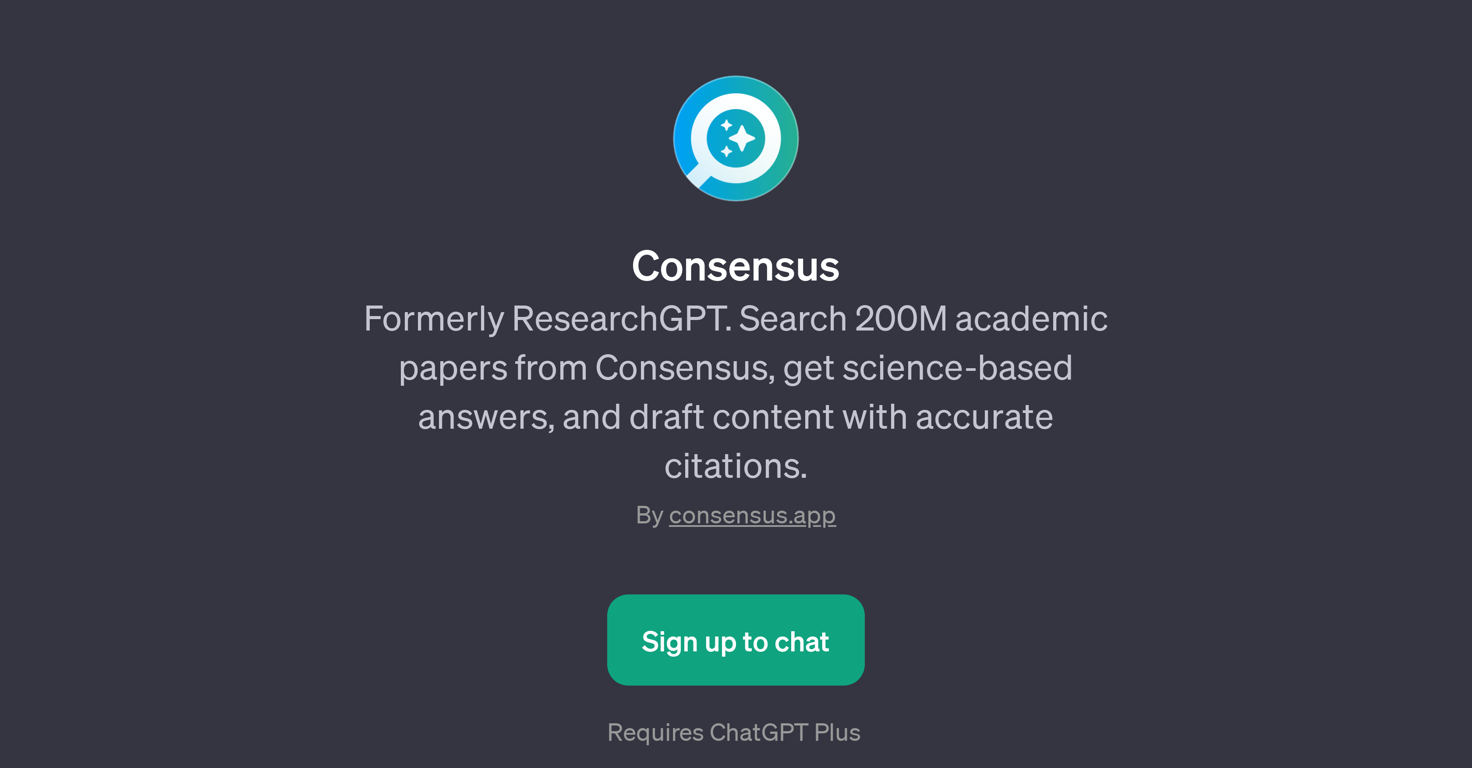Consensus

Overview
Consensus is a GPT essentially designed to provide value in academia and research. Formerly known as ResearchGPT, this tool extensively taps into a stacked library of 200 million academic papers.
Such a vast database makes it an ideal tool for users looking to get answers rooted in scientific evidence and research. Moreover, it facilitates drafting content with accurate citations, helping users adhere to necessary academic standards and saving them valuable time spent on data collection and validation.
The tool functions on top of ChatGPT, enabling an interactive and convenient way of using it. Prompts such as 'Does creatine improve cognition?' or 'Can intergroup contact reduce prejudice?' show its ability to analyze multifaceted topics and answer complex research questions.
Interesting to note is its utility as a drafting tool, for instance, creating an introductory text for a paper on climate change effects on GDP or drafting a blog on the science-backed benefits of mindfulness.
These capacities potentially make it a useful tool for writers, researchers, scientists, academics and students alike, as it can provide an efficient starting point for creating well-informed content.
Another aspect that differentiates Consensus from other GPTs is its ability to use science-based information to produce knowledge and content, thus enhancing its credibility and reliability.
It requires a ChatGPT Plus subscription for access. Note that Consensus is not a replacement for thorough academic research and should be used as a supplement to obtain accurate and science-based answers quickly.
Releases
Top alternatives
-
 Ron Jayson🙏 79 karmaMar 1, 2024@Scholarcyeasy to pick up and you get a few free file imports. it gives you results pretty fast, unfortunately i can't find a way to get back to these, they're locked behind the paid service.
Ron Jayson🙏 79 karmaMar 1, 2024@Scholarcyeasy to pick up and you get a few free file imports. it gives you results pretty fast, unfortunately i can't find a way to get back to these, they're locked behind the paid service. -
I've tried to find the exact articles via WoS, Google, or Scopus. Despite using a very advised and complicated search query, it was just a waste of time. Perplexity didn't help either. The Jenni AI, which may add useful links when generating text, finds nothing but trash. SciScape gave exactly what I needed from the first query! A couple of fresh relative articles with very exact topics!
-
Such an impressive platform for all of us who are looking for more efficient ways to do the investigation. OpenRead has the potential to solve our problems.
-
Think its a fab tool but why wont it allow you to save your workflows?
-
Not particularly useful and expensive at the same time. Don’t waste your time or money.
-
I’ve been using it for a month now and I have decided to keep it for a year. There definitely are some kinks they can still work out like file management, but it’s very good at it’s core function: it generally does a good job answering questions and most times identifies PDFs automatically and correctly. The browser plugin works great, and it’s very nice that Papers allows you to add your university’s library API so you can automatically download PDFs that are accessible through your institution (sometimes it refuses to download some papers, so you just have to downlow it yourself and manually add it). The iPad and Android apps are serviceable. Every once in a while it will mess up the PDF identification, especially with papers from either very old sources or online-only journals. Things they must work on: * A much better system to annotate PDFs (the post-it type notes are cumbersome). * Introduce a notepad attached to each PDF or some way to easily link and save the AI’s output to the PDF. Currently, you have to add a little post it note and then paste the text there. * Keep the AI answers available after closing the documents. If you close the document by mistake or have several open and wish to close some, the ai conversation will be reset. * I REALLY wish that you could get citations and links to where the info was from extracted from PDFs. Currently, I have found Coral.ai does a much better job of showing you where the info came from and it even highlights it for you. Give it a try, their 30-day no credit card needed trial allowed me to truly test it, and now I’m a yearly subscriber looking forward for new additions and releases.


